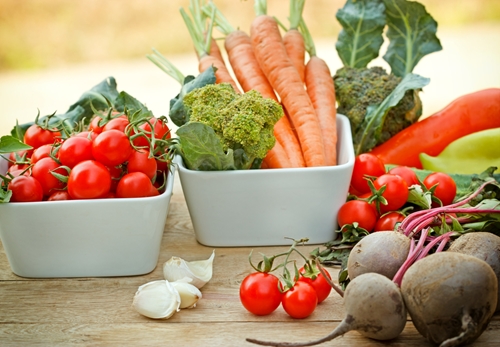Most important nutrients for seniors

Human bodies rely on specific nutrients to function properly. While some nutrients are essential to a healthy body and mind regardless of age, others can become even more vital as you grow older.
How nutrition needs change with age
According to Katherine Tucker of the U.S. Department of Agriculture (USDA) Human Nutrition Research Center on Aging (HNRCA) at Tufts University, people tend to become less active as they age, which in turn leads to a slower metabolism. Because older individuals' energy requirements decrease, they tend to eat less, as well.
Additionally, Tucker spotlighted research showing that older adults have a harder time absorbing and utilizing many nutrients, which makes their need for nutrients that much greater.
Finally, certain medications can affect nutrition requirements, and because older adults are more likely to use prescription drugs, it means seniors are at a greater risk of having adverse nutrient absorption issues.
"Maintaining a nutrient-dense diet is critically important for older adults because of the impact of food intake on health," stated a presentation from Tucker. "Years of research have demonstrated that diet quality has a huge effect on physical condition, cognitive condition, bone health, eye health, vascular function and the immune system."
In short, the importance of senior nutrition grows at the same time that receiving nutrients becomes more difficult. With this in mind, an essential part of senior wellness is focusing on a diet rich in nutrients.
What nutrients are most important?
Among the nutrients highlighted by Tucker were:
- Vitamin E: This nutrient is a crucial antioxidant that can assist immune systems. Adding nuts and seeds, such as almonds and sunflower seeds, to your diet is the ideal way to get enough of this nutrient.
- Vitamin B6: Too little B6 can lead to problems with your metabolism, as well as cognitive function decline and depression. Once again, nuts and seeds are both high in Vitamin B6.
- Magnesium: Like calcium, magnesium is very important for bone health, an issue many seniors struggle with. Doubling up on fruits and veggies is a great way to receive more of this nutrient.
- Vitamin B12: Even though many seniors get enough B12, their stomach is unable to properly absorb it. Also, many acid blocking drugs prevent B12 from being absorbed. You should focus on B12-rich foods, such as fish, meat, poultry, eggs and milk. You may also want to speak to your doctor about taking a supplement.
- Vitamin D: Less exposure to sunlight and reduced kidney function can both lead to Vitamin D deficiency for seniors. In addition to drinking more milk, a supplement may also be necessary to receive the bone and cognitive benefits associated with Vitamin D.
Another common nutrient spotlighted as particularly beneficial to seniors was omega 3 fatty acid. Experts state the acids, which can be found in many types of fish and flaxseed oil, reduce inflammation that can lead to heart disease, cancer and arthritis.
It's also important to remember to stay hydrated. Your body requires the same amount of water to function properly as you age, but you may find yourself not getting thirsty as often.
What to avoid
Just as there are nutrients you should focus on getting enough of, there are others you'll want to avoid as you age. Chief among these is sodium.
Sodium is associated with high blood pressure and other ailments and can be found in processed food. Fresh fruits and vegetables are very low in sodium, making them the best alternative.
Tucker also spotlighted folate as something that can be troublesome. While folic acid can help protect against cognitive decline, too much has been associated with Vitamin B12 deficiency and increased risk of cancer. This means that you should make sure your intake of dark green and leafy vegetables is moderate, as going over board on these types of foods can be detrimental.
Incorporating more nutrients into your diet
Completely transforming your dietary habits overnight is much easier said than done, and some seniors may find themselves having trouble cooking enough varied meals to receive all the nutrients they need.
For this reason, relying on supplements can often be a good way to receive more nutrients. However, it's important to speak with your doctor before you begin taking anything, even if it's just a multivitamin, as this could interfere with certain medications.
Another strategy to receive more nutrients quickly is to begin making special smoothies that contain a number of different foods. By combining various fruits, vegetables and proteins into a single drink, you can obtain the healthy substances you need in one go instead of having to prepare numerous meals and snacks.
- How Medicare Advantage Plans Cover Seniors’ Vision, Hearing, and Dental Needs - October 29, 2024
- 2025 Medicare Part D Changes: How to Save on Prescriptions - October 25, 2024
- Everything You Need to Know About the 2025 Medicare Changes and How They Affect You - October 21, 2024

